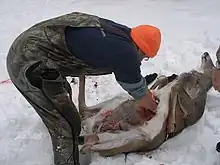
Field dressing, also known as gralloching[1] (/ˈɡræləkɪŋ/ GRA-lə-king), is the process of removing the internal organs of hunted game, and is a necessary step in obtaining and preserving meat from wild animals, such as deer. Field dressing is often done as soon as possible after the animal is killed to ensure rapid body heat loss, which prevents bacteria from growing on the surface of the carcass. Field dressing also aids hunters in transporting hunted game by lightening the weight of the carcass.
Tools

Most hunters use a sharp knife for field dressing. Other tools can be used such as axes or saws. However, the fact that harvesting locations are generally in remote areas makes the transporting and use of larger tools impractical.
Using a knife specifically designed for field dressing and the use of surgical gloves can greatly aid in sanitation.[2]
Risk of disease
Chronic wasting disease (CWD) is a neurological disease and has been found in a growing percentage of deer and elk in certain geographical areas in Canada and the United States. Although there have been reports in the popular press of humans being affected by CWD, a study by the Centers for Disease Control and Prevention (CDC) suggests that "[m]ore epidemiologic and laboratory studies are needed to monitor the possibility of such transmissions."[3] The epidemiological study further concludes that, "[a]s a precaution, hunters should avoid eating deer and elk tissues known to harbor the CWD agent (e.g., brain, spinal cord, eyes, spleen, tonsils, lymph nodes) from areas where CWD has been identified."[3] Tests have also been developed to check for the presence of CWD.
See also
References
- ↑ "Gralloch definition and meaning". www.collinsdictionary.com. Collins English Dictionary.
- ↑ "Wearing protective rubber or disposable gloves as you field dress your deer will make your own clean-up quicker and easier and will reduce the possibility of exposure to disease."
from Field Dressing Your Deer, Division of Wildlife • Ohio Department of Natural Resources, Publication 111, September 2006. - 1 2 Belay, E.D.; Maddox, R.A.; Williams, E.S.; Miller, M.W.; Gambetti, P.; Schonberger, L.B. (June 2004). "Chronic Wasting Disease and Potential Transmission to Humans" (PDF). Emerging Infectious Diseases. CDC. 10 (6): 977–984. doi:10.3201/eid1006.031082. PMC 3323184. PMID 15207045. Retrieved 2008-04-08.